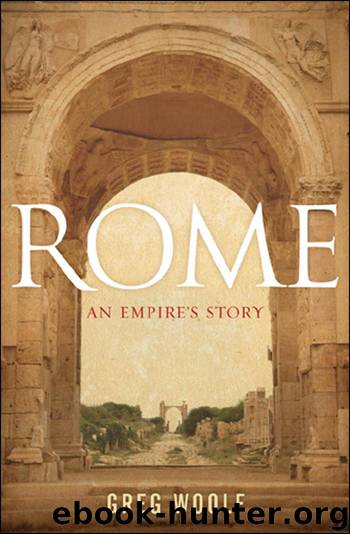Rome by Woolf Greg

Author:Woolf, Greg [Woolf, Greg]
Language: eng
Format: mobi, epub
Publisher: OUP Oxford
Published: 2012-10-26T21:00:00+00:00
Fig 15. The tax law of Ephesus (now in Ephesus Museum)
Yet local diversity persisted, wherever local systems worked. The tax systems created in Egypt by the Ptolemies were far more complex than those of Sicily, and were administered by a bureaucracy headed by a chief minister in the palace. That system too was simply swallowed up after Actium. The royal Idioslogos was now an equestrian official who reported to the prefect of Alexandria and Egypt rather than to the monarch. Other examples abound. Neither Republican generals nor the emperors seemed to feel much need to impose uniform fiscal systems across their domains, so long as the provinces provided what was needed.
Not all parts of the empire had fiscal systems that could so easily be plugged into that of the empire. It is not clear that private property, in the sense that we or Romans would have understood it, even existed in some areas of the north and west before the Roman conquest. Caesar mentioned some customs dues levied by Gallic tribes, but most exchange was not monetized. Here the Romans were forced to develop new mechanisms. A partial exception in the west was the former Carthaginian territory in Spain and North Africa, acquired by Rome after the second and third Punic wars respectively. The silver mines created around Cartagena by Hannibal were confiscated as state property: they were then exploited by hundreds of small-scale contractors using slave labour. Equally the tribute in olive oil paid by the cities of Tripolitania to Carthage was diverted to Rome. But in many areas Romans had to improvise, usually driven by the need to feed and pay armies that might be in the field for much longer than one campaign and might have lesser expectations of booty. It was during the long campaigns in Spain that the pressure was first felt. Local populations had been required to provide subsistence for the armies since the Punic Wars: irregular levies were also made on allies to pay the troops. At some point during the early second century BC these irregular levies became formalized into regular annual levies of cash and grain.29
The reign of Augustus was a period of fiscal reorganization. Even before the military disasters in Germany towards the end of his reign, it was clear that Rome could not keep expanding forever. And the Augustan solution to civil war was expensive. At the centre a military treasury was created in AD 6, funded by a 1 per cent sales tax and a 5 per cent inheritance tax introduced to provide hypothecated income from which veteran discharge bonuses were to be paid. Eventually around 75 per cent of imperial revenue would be spent on the army.30 So great property assessments were made in many provinces during the 20s BC, renewed in theory at regular intervals thereafter, and permanent tax liabilities were fixed on entire communities. The language used was that of the census, but this was not an exercise in distributing political rights and responsibilities of the kind conducted by Republican censors.
Download
This site does not store any files on its server. We only index and link to content provided by other sites. Please contact the content providers to delete copyright contents if any and email us, we'll remove relevant links or contents immediately.
| Africa | Americas |
| Arctic & Antarctica | Asia |
| Australia & Oceania | Europe |
| Middle East | Russia |
| United States | World |
| Ancient Civilizations | Military |
| Historical Study & Educational Resources |
The Daily Stoic by Holiday Ryan & Hanselman Stephen(3317)
The Fate of Rome: Climate, Disease, and the End of an Empire (The Princeton History of the Ancient World) by Kyle Harper(3067)
People of the Earth: An Introduction to World Prehistory by Dr. Brian Fagan & Nadia Durrani(2736)
Ancient Worlds by Michael Scott(2685)
Babylon's Ark by Lawrence Anthony(2676)
The Daily Stoic by Ryan Holiday & Stephen Hanselman(2574)
Foreign Devils on the Silk Road: The Search for the Lost Treasures of Central Asia by Peter Hopkirk(2464)
India's Ancient Past by R.S. Sharma(2454)
MOSES THE EGYPTIAN by Jan Assmann(2416)
The Complete Dead Sea Scrolls in English (7th Edition) (Penguin Classics) by Geza Vermes(2283)
The Earth Chronicles Handbook by Zecharia Sitchin(2229)
Lost Technologies of Ancient Egypt by Christopher Dunn(2225)
24 Hours in Ancient Rome by Philip Matyszak(2084)
Alexander the Great by Philip Freeman(2065)
Aztec by Gary Jennings(2028)
The Nine Waves of Creation by Carl Johan Calleman(1917)
Curse Tablets and Binding Spells from the Ancient World by Gager John G.;(1861)
Before Atlantis by Frank Joseph(1850)
Earthmare: The Lost Book of Wars by Cergat(1825)
